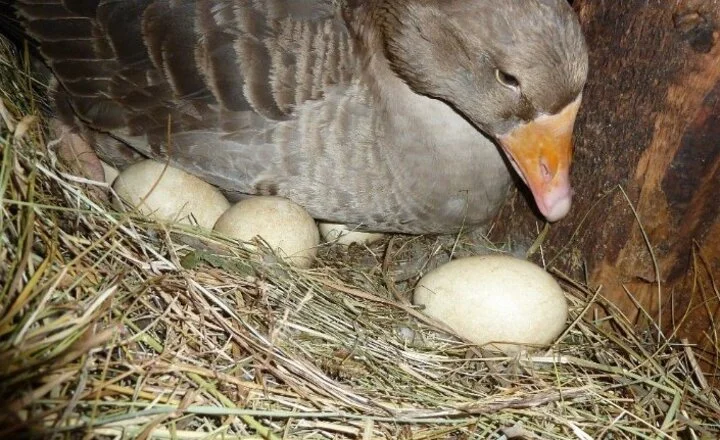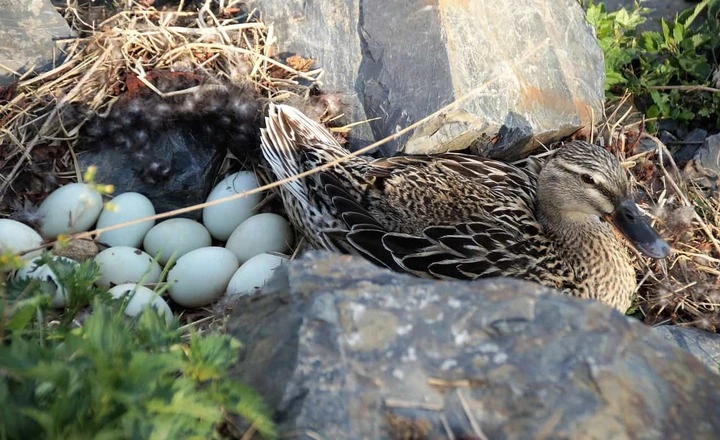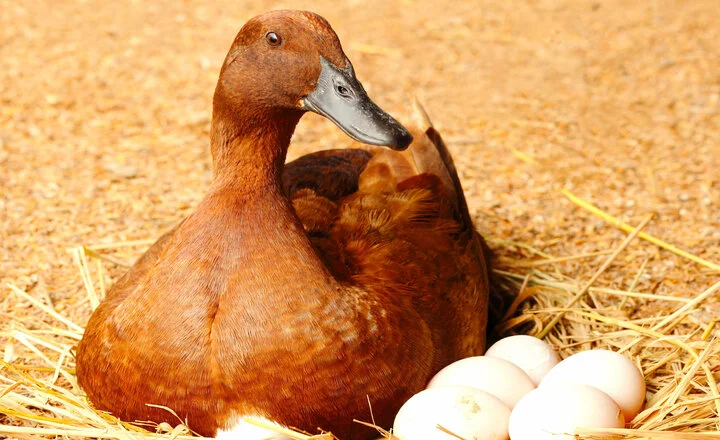Geese hold a special place with their graceful flight formations and honking calls that echo across lakes and fields. But amidst all the admiration for these majestic waterfowls, a curious question Do Geese Lay Eggs?
While it may seem like a simple inquiry, delving into the intricacies of goose reproduction unveils a fascinating journey through nature’s marvels.
Do Geese Lay Eggs?
Yes, geese do lay eggs. Similar to chickens and ducks, geese lay eggs as part of their reproductive cycle. Geese have a unique laying schedule, typically preferring to lay eggs in the spring and early summer after the mating period has begun.
Eggs are larger and more seasonal compared to chicken eggs, making them a sought-after delicacy for many culinary enthusiasts.
Their eggs are known for their rich flavor and unique taste profile. While they can be cooked and baked in similar ways as other types of eggs, many people enjoy the distinct richness that goose eggs bring to dishes.
Some describe the taste of goose eggs as slightly richer and more eggy than chicken eggs, with a texture that is often likened to duck eggs. They lay delicious and prized eggs that can add a special touch to various recipes.
Geese Egg Production
They are known for their regular breeding and laying schedule, typically laying eggs between March and June. It takes about 35 days for the eggs to fully hatch, making it essential for geese farmers to plan accordingly.
Unlike chickens and ducks that can lay eggs almost year-round, geese are seasonal layers that require specific conditions to produce eggs. They need approximately 10 hours of daylight to stimulate egg-laying.

Factors like breed, age, and climate play a significant role in determining the egg production of geese. The climate can impact egg production as geese thrive in certain temperature ranges. Understanding these factors can help farmers optimize their geese egg production throughout the year.
How Do Goose Eggs Taste Like?
Goose eggs have a unique and rich flavor compared to chicken eggs. They are larger and have a creamier texture, making them a popular choice for those looking to switch up their breakfast routine.

When cooked, goose eggs have a slightly gamey taste that sets them apart from traditional hen eggs. Many people enjoy the bold flavor of goose eggs, finding them to be a delicious alternative to regular eggs.
They can be used in various dishes such as omelets, quiches, or simply fried or boiled. If you’re looking to try something new and add a twist to your morning meal, give goose eggs a try for a flavorful and satisfying breakfast experience.
How Many Eggs does Goose lay?
The number of eggs a goose lays annually can vary depending on the breed and age of the bird. Geese typically lay between 20 to 40 eggs in a year, with some breeds exhibiting higher egg production rates than others.
For example, the Toulouse Goose is a heavily farmed breed known for its increased egg production, laying as many as 20 to 40 eggs per year.
Breeds like the Canada Goose and Egyptian Goose produce fewer eggs, with only four to nine and eight to nine eggs per clutch, respectively.
Chinese Geese are considered one of the best egg-laying breeds due to their impressive productivity, with some individuals laying up to 60 eggs in a year.
Farmers and breeders need to consider these factors when selecting geese for egg production purposes, as different breeds offer varying levels of efficiency in terms of egg laying.
How Often Do Geese Lay Eggs?
Geese normally have a more limited egg production compared to chickens, with a single female goose laying one egg every one or two days a week. Certain geese breeds like the Chinese Goose or Swan Goose have been selectively bred to lay eggs more frequently.

Chinese geese are mostly known for being better and more frequent egg producers than other breeds. They usually start laying eggs after about a month when the mating period begins.
It is important to consider the specific breed of geese when expecting consistent egg production, as some varieties are more prolific layers than others due to selective breeding efforts over time.
Where Do Goose lay Eggs?
Goose typically lay their eggs in nests that they build on elevated areas such as hills, covered by bushes and greenery. These locations provide them with a sense of security and protection from predators while they incubate their eggs.
Having a nearby lake is also ideal for geese, as it provides a source of water for them to access easily. The choice of location for laying eggs is crucial for the survival of the goose and its offspring.
By selecting high ground with vegetation cover, geese can better camouflage their nests and reduce the risk of being detected by predators.
This nesting behavior reflects the instinctual drive of geese to ensure the safety and well-being of their young, making their choice of location a vital aspect of their reproductive strategy.
Fun Facts About Goose Eggs
Goose eggs are fascinating for several reasons. They are larger and heavier than chicken or duck eggs, with a single goose egg equivalent to two duck eggs or three chicken eggs.

They start laying eggs relatively early with good size, with females beginning to lay as young as 9 months old. Goose eggs pack a nutritional punch, containing 266 calories, 19g of fat, 20g of protein, and 1227 mg of cholesterol in a single egg.
These unique characteristics make goose eggs an interesting option for culinary experimentation.
When is Nesting Season and Where do Geese Typically Nest?
It usually starts in early March and can last until late May. Geese choose nesting spots that are close to water sources, such as ponds or lakes, but they may also nest up to half a mile away.
They prefer locations where they have a clear view of approaching predators, which is why nesting near buildings and parking islands has become common in urban areas.
Geese use a variety of materials to build their nests, including roof gravel, mulch, grass, their own down feathers, and even trash. These materials help provide insulation and protection for the eggs during incubation.
Conclusion
Geese do indeed lay eggs, with female geese typically laying one egg per day until they have a full clutch. These eggs are then incubated for about a month before hatching into adorable goslings.
Understanding the egg-laying process of geese can provide valuable insights into their reproductive behavior and life cycle.
Next time you see a goose nesting or laying eggs, take a moment to appreciate the wonder of nature and the miracle of new life unfolding before your eyes.
FAQs
Can a goose live 100 years?
A goose typically has a lifespan of around 10-24 years in the wild. Domestic geese may live slightly longer, up to 25 years on average.
How long does a goose egg last?
A goose egg can last for several weeks if properly stored. It is recommended to store goose eggs in the refrigerator at a temperature of around 35-40 degrees Fahrenheit.
How many days do goose eggs hatch?
Goose eggs typically take around 28-30 days to hatch. The incubation period can vary slightly depending on the specific breed of goose, with some breeds taking a few days longer or shorter to hatch.
Do male geese sit on eggs?
Male geese do not typically sit on eggs. It is the female goose that incubates the eggs to keep them warm and safe until they hatch.
